DrExcel Health - Demo Day
March 29, 2019
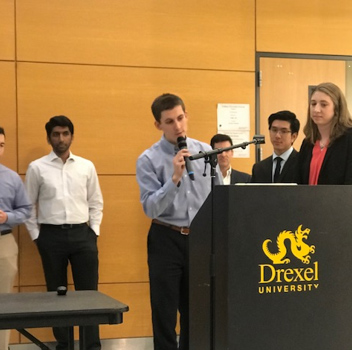
Medical student Bryan Rettner, MS1, sets the stage for his group’s problem.
I’m not exactly sure when it happened, but somehow my weekend has shifted focus from quiet days of reflection and rejuvenation after a long work week to shuttling my kids back and forth between science fairs, soccer games, birthday parties and play dates, and this past weekend was no different. As I was unloading the car, a large poster board tumbled out of the backseat. As I tried to pick it up without dropping anything else, I realized it was my 11-year old step-daughter’s science project. She’s been involved in her school and region’s science fairs ever since I can remember, so the poster display itself was no surprise. But what did catch my eye was the fact that for the first time her class was encouraged to broaden their definition of “science projects” and include an aspect from one of their non-science classes. So this year, she did a social science experiment to explore if the stereotype that a majority boys like blue while a majority of girls like pink held true. Given the line of work I’m in, I couldn’t help but be proud of her.
Interdisciplinary projects like this are becoming more and more common. Regardless of where a student is in their academic journey, chances are they’re going to have to collaborate and think across disciplines. The College of Medicine is no different. Our Foundations and Frontiers curriculum instills the qualities essential to clinical excellence with emerging competencies such as an understanding of population health, health informatics, quality and patient safety, and health care systems and financing. The program stresses teamwork and communication, clinical problem-solving skills and information technology necessary to becoming a well-rounded and innovative clinician.
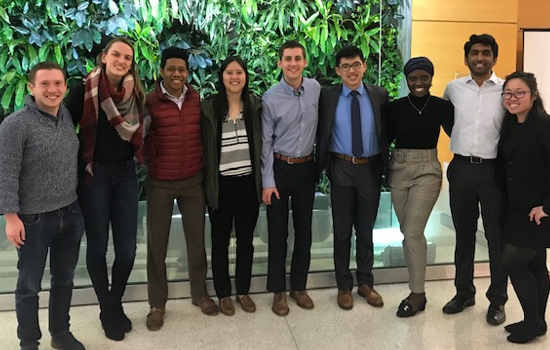
DrExcel Health Members
Drexel's Medical Humanities Program is one of the first of its kind developed to help physicians understand that in order to be an effective and compassionate health care provided one must not only master the science, but also acquire greater human understanding. By delving into the lived experience of illness, healing and doctoring with attention to meaning, values and the history of ideas, our Drexel University College of Medicine graduates are equipped to relieve suffering, understand the psychosocial impact of illness and disability, find deeper value in the practice of medicine, develop moral sensitivity, confront mystery, learn from history, address social determinants of disease, and monitor the biases and limitations of science. These classes include but are not limited to literature, visual arts, theater, film philosophy, ethics, religious and spiritual thought, contemplative studies history, anthropology, sociology and cultural studies.
Further, our student groups echo these sentiments as well. I recently attended an event hosted by one of our student organizations, DrExcel Health. DrExcel Health seeks to facilitate interdisciplinary collaboration between students at the College of Medicine, College of Biomedical Engineering, College of Public Health and Close School of Entrepreneurship. These students get together to tackle unmet clinical challenges under physician mentorship and the group attempts to address this topic through multiple avenues. These include an Educational speaker series hosted each month that showcases professionals and how their practice of medicine is integrated with fields such as business, industry or research. They also have their own podcast series named “Beyond the Bedside,” which features medical professionals, their journey to medicine, and how their life and interdisciplinary experiences have shaped their medical careers. Finally, their Labs program provides a unique opportunity for teams of biomedical engineering undergraduate students and medical students to work with a physician mentor to define an unmet clinical need and design a prototype device that may solve that clinical need. Students work on these projects over several semesters with the goal of presenting their prototype to a group of students, physicians, business executives and entrepreneurs.
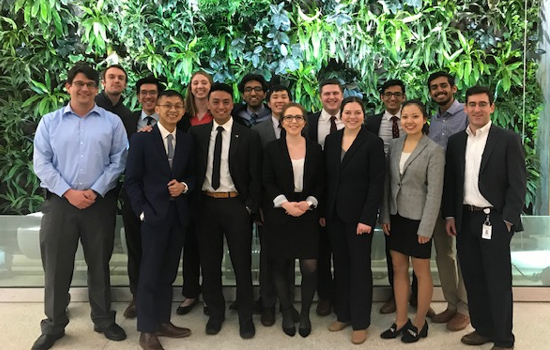
Medical students, undergraduate students and faculty/physician mentors work together.
This event, known as Demo Day, is one I attended and experienced firsthand. Seeing how the students worked together, each using their own strengths and capitalizing on the knowledge of others, was truly inspiring. The projects they presented were thoughtful, unique and really attempted to address medical needs from a variety of angles and perspectives. Seeing and hearing the thoughtful approach to each group’s solution drove home the value, once again, of thinking across multiple disciplines. Both our MD students and the biomedical engineering students will be better practitioners because of this experience. I’m so glad that Drexel University College of Medicine supports this type of learning both in and out of the classroom!
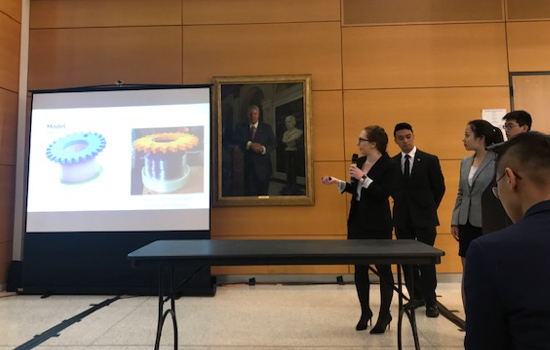
Undergraduate biomedical engineering students present their prototype.
Also, I must say congratulations to College of Medicine students Bryan Rettner, Kevin Yang and Kemi Adesina who will be attending Sling Health’s National Conference on April 13th in St. Louis, MO, to present their Demo Day prototype! (Sling Health is DrExcel Health’s parent organization.)
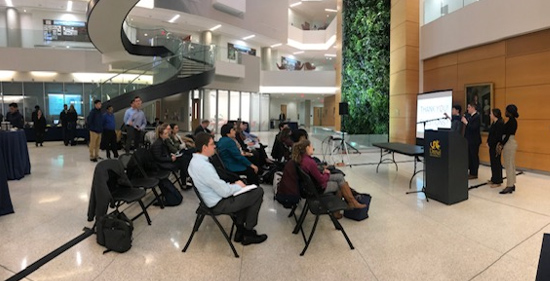
DrExcel Health Demo Day was held in the PISB Atrium.
Back to Top